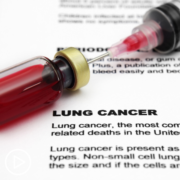Deciding on a Treatment Plan: Where Do Clinical Trials Fit In?
Lung Cancer Treatment Approaches: What Are Your Options? from Patient Empowerment Network on Vimeo.
Could a clinical trial be right for your lung cancer? Dr. Jessica Bauman, a specialist in lung cancer, discusses where clinical trials fit into the treatment plan and the role that trials play in the future of lung cancer care.
Dr. Jessica Bauman is assistant professor in the department of hematology/oncology and as associate program director of the hematology/oncology fellowship training program at Fox Chase Cancer Center in Philadelphia. Learn more about Dr. Bauman here.
See More From the The Pro-Active Lung Cancer Patient Toolkit
Related Programs:

|
Why You Should Consider a Clinical Trial for Lung Cancer Treatment |

|
Transcript:
Katherine:
How do clinical trials fit into the treatment plan?
Dr. Bauman:
So, clinical trials are very important in all of our decision making. So, there are many different kinds of clinical trials, but clinical trials are where we are offering the newest potential treatment options for patients. And there are some clinical trials where it’s a brand-new drug that’s never been in a person before, but there are also clinical trials of drugs that we use from a different disease that has been effective, and now it has good evidence, potentially, in lung cancer, and so it’s being used in lung cancer. There are also trials of new combinations of treatments.
So, for example, one of the most recent, sort of, classic treatment-changing trials was a large trial where everybody who had chemotherapy and radiation for stage III lung cancer, then received a year of immune therapy versus not receiving immune therapy to see if that new treatment would help them live longer or would prolong their survival.
And, in fact, that trial was very positive, and so it changed the way we treat stage III lung cancer. So, again, these are just examples of types of clinical trials. But clinical trials are where we are finding out what may be the next best treatments for patients.
And so, when I’m thinking about a treatment approach to a patient, I’m incorporating all of the things that we talked about, but I’m also then thinking about, “Are there clinical trials that may also be relevant to them for their specific situation?” whether that is a clinical trial that involves surgery in some way, or whether that’s a clinical trial that involves a new drug, whether it’s a clinical trial that’s offering a new kind of supportive care.
So, there are lots of different kinds of clinical trials that may be relevant to patients.
Katherine:
Are there emerging approaches for treating lung cancer that patients should know about?
Dr. Bauman:
So, absolutely. I think that there are so many clinical trials that are going on right now for all sorts of different lung cancers.
I think one of the amazing parts about lung cancer right now is how, as I said before, how personalized it has become, and how each individual, depending all of the different factors we talked about, what treatments are best for them. But it also depends on there also may be clinical trials that are specific for that person. And so, for example, if you have a new diagnosis of stage IV cancer, and you have an EGFR mutation or an ALK mutation, you want to know about clinical trials that are specific to that population because for you, those are what are most relevant for you.
If you have a new diagnosis of a stage III lung cancer, then you want to know, “What are the clinical trial options for patients who have stage III lung cancer?” And so, there are many clinical trials that are asking, sort of, the next best question of, “How can we improve the current standard of care?” And often there really are trials in each of these different areas. So, it’s not just a one-size-fits-all.
Katherine:
Some patients can be fearful when it comes to clinical trials. What would you say to someone who might be hesitant in participating in one?
Dr. Bauman:
So, I very much understand that. I think any kind of treatment can be a scary thing. But I think, as I said before, I think the more that you can understand about your cancer and understand about the science and the research, it helps you then understand where the trial fits in terms of your treatment options.
I think that if you understand what to expect from the treatment that you’re getting, and then what the plan B and plan C could look like, I think that piece of it is also important. And you know, I think that one of the hardest parts about lung cancer right now is even though we have all of these new promising therapies and multiple new approved drugs, with a diagnosis of stage IV lung cancer, most of the time the cancer learns to grow. And so, even though we have treatments that work really well, there will be a time for most people where the cancer starts to grow, and we need to think about, “Well, why is the cancer growing?”
And often, that is the setting where clinical trials are very relevant because clinical trials are often thinking about just that, “Well, why is the cancer becoming resistant? What is different about the cancer now? And is there some change that would make it relevant for you to do one specific trial over another specific trial?”











